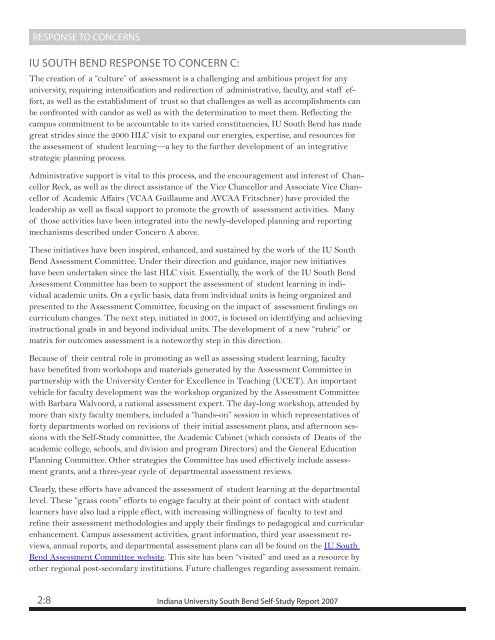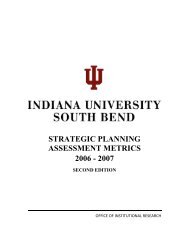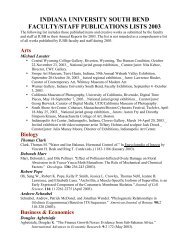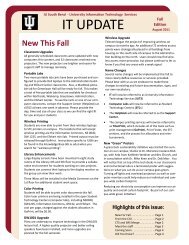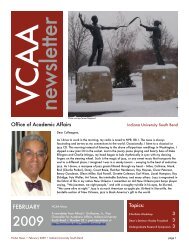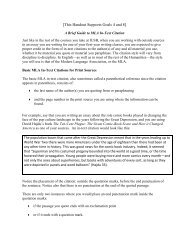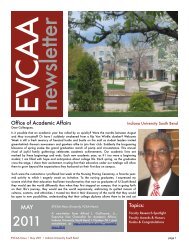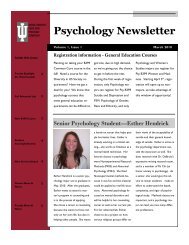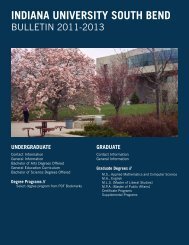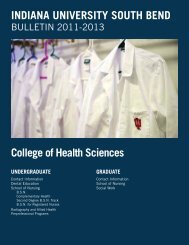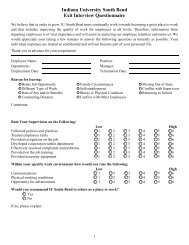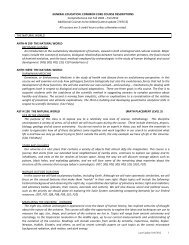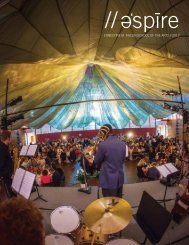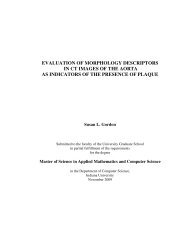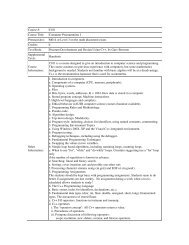HLC Self-Study - Indiana University South Bend
HLC Self-Study - Indiana University South Bend
HLC Self-Study - Indiana University South Bend
Create successful ePaper yourself
Turn your PDF publications into a flip-book with our unique Google optimized e-Paper software.
RESPONSE TO CONCERNS<br />
IU <strong>South</strong> <strong>Bend</strong> Response to Concern C:<br />
The creation of a “culture” of assessment is a challenging and ambitious project for any<br />
university, requiring intensification and redirection of administrative, faculty, and staff effort,<br />
as well as the establishment of trust so that challenges as well as accomplishments can<br />
be confronted with candor as well as with the determination to meet them. Reflecting the<br />
campus commitment to be accountable to its varied constituencies, IU <strong>South</strong> <strong>Bend</strong> has made<br />
great strides since the 2000 <strong>HLC</strong> visit to expand our energies, expertise, and resources for<br />
the assessment of student learning—a key to the further development of an integrative<br />
strategic planning process.<br />
Administrative support is vital to this process, and the encouragement and interest of Chancellor<br />
Reck, as well as the direct assistance of the Vice Chancellor and Associate Vice Chancellor<br />
of Academic Affairs (VCAA Guillaume and AVCAA Fritschner) have provided the<br />
leadership as well as fiscal support to promote the growth of assessment activities. Many<br />
of those activities have been integrated into the newly-developed planning and reporting<br />
mechanisms described under Concern A above.<br />
These initiatives have been inspired, enhanced, and sustained by the work of the IU <strong>South</strong><br />
<strong>Bend</strong> Assessment Committee. Under their direction and guidance, major new initiatives<br />
have been undertaken since the last <strong>HLC</strong> visit. Essentially, the work of the IU <strong>South</strong> <strong>Bend</strong><br />
Assessment Committee has been to support the assessment of student learning in individual<br />
academic units. On a cyclic basis, data from individual units is being organized and<br />
presented to the Assessment Committee, focusing on the impact of assessment findings on<br />
curriculum changes. The next step, initiated in 2007, is focused on identifying and achieving<br />
instructional goals in and beyond individual units. The development of a new “rubric” or<br />
matrix for outcomes assessment is a noteworthy step in this direction.<br />
Because of their central role in promoting as well as assessing student learning, faculty<br />
have benefited from workshops and materials generated by the Assessment Committee in<br />
partnership with the <strong>University</strong> Center for Excellence in Teaching (UCET). An important<br />
vehicle for faculty development was the workshop organized by the Assessment Committee<br />
with Barbara Walvoord, a national assessment expert. The day-long workshop, attended by<br />
more than sixty faculty members, included a “hands-on” session in which representatives of<br />
forty departments worked on revisions of their initial assessment plans, and afternoon sessions<br />
with the <strong>Self</strong>-<strong>Study</strong> committee, the Academic Cabinet (which consists of Deans of the<br />
academic college, schools, and division and program Directors) and the General Education<br />
Planning Committee. Other strategies the Committee has used effectively include assessment<br />
grants, and a three-year cycle of departmental assessment reviews.<br />
Clearly, these efforts have advanced the assessment of student learning at the departmental<br />
level. These “grass roots” efforts to engage faculty at their point of contact with student<br />
learners have also had a ripple effect, with increasing willingness of faculty to test and<br />
refine their assessment methodologies and apply their findings to pedagogical and curricular<br />
enhancement. Campus assessment activities, grant information, third year assessment reviews,<br />
annual reports, and departmental assessment plans can all be found on the IU <strong>South</strong><br />
<strong>Bend</strong> Assessment Committee website. This site has been “visited” and used as a resource by<br />
other regional post-secondary institutions. Future challenges regarding assessment remain.<br />
2:8<br />
<strong>Indiana</strong> <strong>University</strong> <strong>South</strong> <strong>Bend</strong> <strong>Self</strong>-<strong>Study</strong> Report 2007


